Institute of Molecular Biology and Genetics (IMBG)
Team
The Institute of Molecular Biology and Genetics (IMBG) - is one of the leading institutions in life science research and biotechnology in Ukraine of high-level research potential and excellent results of investigations, especially in biomolecular electronics area. Presently its staff comprised of 300 employees, 28 Doctors of Sciences (Dr.Sc), 106 Doctors of Philosophy (PhD), 3 Members of NASU and 5 Corresponding Members of NASU and 20 PhD students.
The IMBG research activity is concentrated on the modern trends in molecular biology, genetics, biotechnology, bioinformatics, computational modeling and design. IMBG participated actively in several National and State Science&Technology programs, among them:
• «Urgent Measures for Liquidation of the Chernobyl Disaster Consequences and Social Protection of Population»;
• «Protection of Population from the Most Widely Spread Infectious Diseases»;
• «National Programme for AIDS Prevention»;
• «Health of the Nation»;
• «Gene and Analytical Biotechnologies»
• «Introduction and Application of Grid Technologies»
• «Elaboration and Creation of Sensor Science-Intensive Products»
• «Implementation and application of grid-technologies»
• «Nanotechnologies and Nanomaterials»;
• «Elaboration of Novel Technologies of Inventing National Medical Preparations for Human Health Protection and Meeting the Requirements of Veterinary Medicine» etc.
The IMBG scientists were awarded with 33 State Prizes of Ukraine in Science and Technology, 3 Prizes of the Verkhovna Rada for young scientists, 4 Prizes of the Cabinet of Ministers of Ukraine for young scientists, 13 Personal Prizes of NAS of Ukraine, 29 Prizes of the President of Ukraine designated for young scientists, and special Diploma of the Cabinet of Ministers of Ukraine for the essential scientific contribution for creation and application of new biotechnologies and biomedicine results. Over 5600 scientific articles were published by the scientists of the Institute, out of which nearly 1600 articles were published in renowned peer review international journals including Science, Nature Structural & Molecular Biology, Cell, Biochemistry, Human Genetics, Human Mutation, Proteins, Nucleic Acid Research, Journal of Biological Chemistry and others. Since the Institute was founded, its employees obtained 280 author's certificates and patents. About 150 conferences, meetings, scientific schools including international ones were hosted in IMBG.
The Institute is very active in international cooperation. For many years IMBG scientists collaborate successfully with their foreign colleagues from Germany, France, USA, Great Britain, Poland, Italy, Greece, Japan, Russia, Belarus and other - about 31 countries in total. Strong long-time bilateral relations IMBG has with the institutions of France, Germany and Poland.
The Departmentof Biomolecular Electronics has been actively working on biosensors development since 1991. The Department has specialists in different fields such as radiophysics and electronics, biotechnology, biochemistry and analytical chemistry.
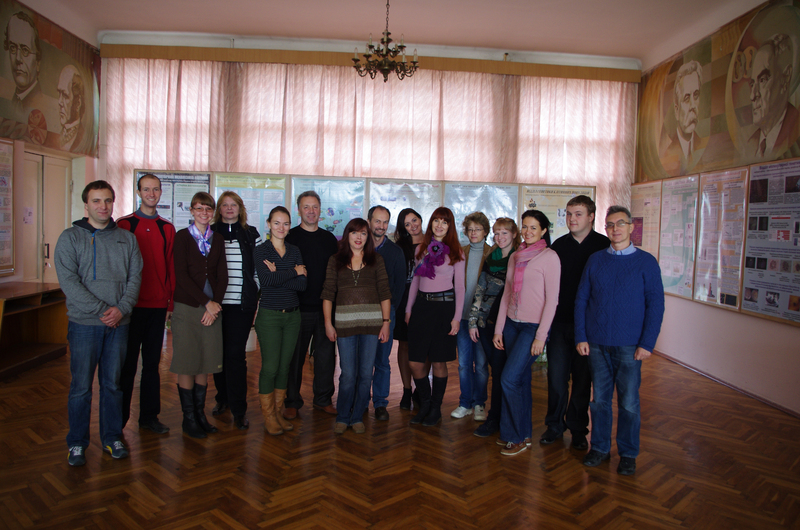
The permanent staff of the Department is composed of 14 researchers, 5 engineers and technicians. In addition, 9 PhD students and 15 graduate students are working in the Department.
Principal Investigators
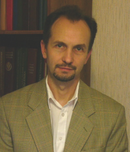 |
Prof. Sergei Dzyadevych(male) is Vice-director of Institute of Molecular Biology and Genetics from June and he was the Chief Scientist of Department of Biomolecular Electronics before. He received his MS degree in radiophysics and electronics from Taras Shevchenko Kiev State University in 1992, his PhD degree in biotechnology from Palladin Institute of Biochemistry in 1995 and Doctor Science degree in biotechnology from Institute of Molecular Biology and Genetics in 2005. Since 1995 he worked successively as researcher, senior researcher and leader researcher in IMBG. During 1996-2005 he worked as an invited researcher at Institute of Chemo-and Biosensorics (Muenster, Germany), Leeds University (UK), Claude Bernard University Lyon 1 (France) and Ecole Centrale de Lyon (France). His field of interests includes different aspects of development and application of devices of biomolecular electronics. Now he is Scientific Secretary and Head of Work Group of Program of National Academy of Sciences for Development of Sensors Technologies in Ukraine. To date, he has published more than 140 refereed Scopus papers and his h-index is 30. |
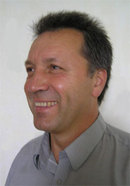 |
Prof. Alexey P. Soldatkin (male) is Head of Departmentof Biomolecular Electronics, Academician of the National Academy of Sciences of Ukraine. He received his MS degree in biochemistry in 1978, his PhD degree in molecular biology in 1985 and Doctor Science degree in biotechnology in 1999. Since 1978 he worked as engineer, researcher, senior and leader researcher in the Institute of Molecular Biology and Genetics of National Academy of Sciences of Ukraine. Now he is head of the Laboratory of Biomolecular Electronics with permanent staff of 20 people. Since 1996 he was the co-director of different international projects in the field of developing enzyme biosensors. To date, he has published more than 160 refereed Scopus papers and his h-index is 34. |
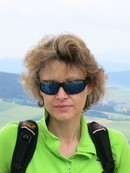 |
Dr. Valentyna N. Arkhypova (female) is Senior Scientist of Department of Biomolecular Electronics. She received her MS degree in radiophysics and electronics from Taras Shevchenko Kiev State University in 1993, her PhD degree in biotechnology from Palladin Institute of Biochemistry of National Academy of Science of Ukraine in 1998. Since 1998 she works as a researcher and senior researcher in the Department of Biomolecular Electronics of the Institute of Molecular Biology and Genetics (Kiev, Ukraine). Her main field of interest is application of cholinesterases for development of different biosensors. To date, she has published more than 40 refereed Scopus papers and her h-index is 15. |
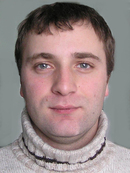 |
Dr. Oleksandr O. Soldatkin (male) is Senior Scientist of Department of Biomolecular Electronics. He received his MS degree in the “Biotechnical and medical apparatus and systems” from National Aviation University of Ukraine in 2004, and his PhD degree in biotechnology from Institute of Molecular Biology and Genetics in 2009. Since 2008 he works as a researcher and senior researcher in the Department of Biomolecular Electronics of the Institute of Molecular Biology and Genetics (Kiev, Ukraine). His research activities concern the development of conductometric, potentiometric, amperometric biosensors and multibiosensors. To date, he has published more than 50 refereed Scopus papers and his h-index is 13. |
Project Management IMBG staff:
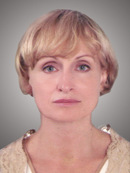 |
Olga Korzh, MSc (female) - a head of IMBG Scientific Information Department. She has good connections with mass-media and excellent experience in organizing of promotion measures (including successful FP7 project) together with the WP5 Task Leaders information spreading activities. |
 |
Oleksandr Skorohod, PhD (male) – IMBG Researcher, the former Head of the IMBG Young Scientists Council and the former Head of the NASU Young Scientists Council, President in NGO “Unia Scientifica”. He was the Head of the Organizing Committee of annual IMBG young scientists conferences 2011-2017 (Kyiv, Ukraine), and several international Conferences: The International Conference for Young Scientists (CYS)-2011 (Kyiv, Ukraine, 200 participants, 25 countries), The Multidisciplinary Symposium in Molecular Oncology (MolOnco)-2012 (Kyiv, Ukraine, 130 participants, 15 countries), International Conference for Young Scientists (CYS)-2015 (Kyiv, Ukraine, 150 participants, 17 countries). He was co-organizer of Days of Science project in Ukraine (held since2014 – 7 cities in Ukraine, more than 10000 participants), co-organizer of the Forum “Science. Business. Innovations” (2015, 2017 Kyiv, Ukraine, up to 70 participants and 50 participants respectively), co-organizer of The First German-Ukrainian Summer School for Life scientists (2017) (Berlin, Germany, 8 projects, 13 participants from Ukraine). |
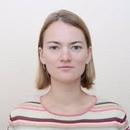 |
Dr. Viktoriya Peshkova PhD (female) - is a Senior Scientist in the Department of Biomolecular Electronics. She received her PhD degree in biotechnology from Institute of Molecular Biology and Genetics of National Academy of Science of Ukraine in 2009. Since 2010 she works as a researcher and senior researcher in the Department of Biomolecular Electronics of the Institute of Molecular Biology and Genetics (Kiev, Ukraine). Her main field of interest is development of conductometric biosensors for application in food industry. To date, she has published more than 13 refereed Scopus papers and her h-index is 7. |
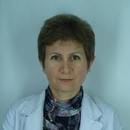 |
Dr. Yanina Mishchuk, PhD (female) - IMBG Scientific Manager and Scientific Secretary of IMBG Scientific Council. She received a PhD in Molecular Biology(1993), Senior Scientist of the Department of Molecular and Quantum Biophysics of IMBG. Since 2001 she acted as the Science Manager of IMBG, Coordinator of the Thematic Information Point of National Academy of Sciences of Ukraine in FP6 priority “Life sciences, genomics and biotechnology for health” and FP7 priority “Health”, and H2020ERC NCP Ukraine since 2015. Yа. Mishchuk has a lot of personal experience in writing and management them was theFP7 ERA-WIDE project "Strengthening Cooperation in Molecular Biomedicine between EU and Ukraine",COMBIOM # 294932, 2011-2015 (received EU funding € 455 000,0). The Institute of Molecular Biology and Genetics of NASU was the COMBIOM Project Coordinator, and Mishchuk Ya.R. wasthe COMBIOM Project Manager. She organizedand/or participated in 12 Information Days, made 14 reports explaining to Ukrainian scientists the possibilities and rules of participation in the FP EC Calls, including presentations at regional seminars in the cities of Odessa, Kharkiv, Uzhgorod, Vinnitsa. As the EC expert on international cooperation, she participated in evaluation of project proposals for the FP7 INCO-2013 Calls number 1, 2, 3, 4, and 9, including expert panel discussions in Brussels. Now she works as the expert for the H2020 “ERC-MSCA-FET” Programme Committee. |
Department members
Soldatkin A. P. – Head of Department, Academician of NAS of Ukraine, Dr. Sci. (Mol. Biol.), Prof.
Dzyadevych S. V. – Chief Scientist, Dr. Sci. (Biotechn.), Prof.
Korpan Ya. I. - Leading Research Scientist, PhD (Biotechn.)
Sergeeva Т. А. – Leading Research Scientist, Dr. Sci. (Biotechn.)
Arkhypova V. M. – Senior Research Scientist, PhD (Biotechn.)
Biloivan О. А. – Senior Research Scientist, PhD (Biotechn.)
Rachkov О. Е. - Senior Research Scientist, PhD (Mol. Biol.)
Kukla О. L. - Senior Research Scientist, PhD (Physics, math.)
Soldatkin О. О. – Senior Research Scientist, Dr. Sci. (Biotechn.)
Shkotova L. V. – Senior Research Scientist, PhD (Biotechn.)
Zinchenko О. А. – Senior Research Scientist, PhD (Biotechn.)
Pyeshkova V. М. – Senior Research Scientist, PhD (Biotechn.)
Marchenko S. V. – Research Scientist, PhD (Biotechn.)
Sayapina О. Ya. – Research Scientist, PhD (Biotechn.).
The Department of Biomolecular Electronics is focused on the development of electrochemical (amperometric, potentiometric (ISFET), conductometric) and optical chemo/biosensors for monitoring of environmental and food contamination, quality control of food and pharmaceutical products, control of biotechnological processes and for medical diagnosis.
Scientific research:
Development of micro/nano electrochemical bio- and chemo-sensors for the determination of some neurotransmitters (acetylcholine, glutamate, etc.), alcohols, carbohydrates, aldehydes, toxic substances (heavy metal ions, pesticides, aflatoxins, etc.), urea, ammonium, arginine and blood metabolites in vitro and in vivo.
• Application of nanomaterials (carbon nanotubes, gold nanoparticles, nanodiamonds and zeolites) to improve analytical characteristics of bio- and chemo-sensors.
• Application of new genetically engineered proteins and synthetic molecules as a recognition element for sensors with improved analytical characteristics.
• Creation and study of synthetic analogues of biological receptors by molecular imprinting (molecular imprinted polymers - MIP) and their implementation in sensor technology, solid phase extraction and chromatography.
• Development of electrochemical and optical affine (immune- and DNA-) sensors.
• Study on fundamentals of the interaction of immobilized enzymes with substrates and inhibitors using electrochemical sensors.
More than 50 laboratory prototypes of enzyme biosensors for determination of glucose, urea, organophosphoruspesticides, heavy metal ions, formaldehyde and other compounds have been developed in thisLaboratory. These results were published in more than 400 articles and books.
5 relevant previous projects
• COMBIOM: FP7 INCO ERA-WIDE project "Strengthening Cooperation in Molecular Biomedicine between EU and Ukraine", No294932, 2011-2015 (coordinator: Prof. Anna Elskaya).
• NANOBIOSENS: FP7 Marie-Curie IRSES project “New materials for biosensors application”, No PIRSES-GA-2008-230802, 2009-2011 (Principal Investigator: Prof. S. Dzyadevych).
• NANODEV: FP7 Marie-Curie IRSES project “Integrated nanodevices”, NoPIRSES-GA-2012-318524, 2013-2015 (Principal Investigator: Prof. S. Dzyadevych)
• HemoSensor: Eureka project No EU8835, 2015-16 (Principal Investigator: Prof. A. Soldatkin).
• NATO Science for peace and security Grant “Development of biosensors for botulinum neurotoxin determination with applicability to screening foods against biological terrorist attacks”, No CBP.NUKR.CLG984221, 2010-2013 (Principal Investigator: Prof. S. Dzyadevych).
Significant infrastructure
The Departmentof Biomolecular Electronics is equipped with all necessary apparatus to create new enzyme biosensors for intelligent biosensor systems based on enzymes and microelectronic transducers for medical diagnostics, environmental monitoring, food and agricultural industries.

There is the apparatus for potentiometric, amperometric, conductometric measurements, including devices for application with potentiometric transducers MEC-5, Ukraine (15 pieces); portable potentiostats for amperometric research "PalmSens", Netherlands (3 pieces), "DropSens", Spain (2 pieces) and device "MXP-3", Ukraine; multifunctional device for impedance measurement "VoltaLab", France; portable conductometric devices "МСР-3", Ukraine (3 pieces); phase-sensitive nanovoltmeters "Lock-in type 232 B", Poland; differential amplifiers "Unipan type 233-6" (3 pieces); low-frequency generator ГЗ-118 (3 pieces); voltmeters В7 40/3 (4 pieces); electromagnetic stirrers "IKA topolino" (10 pieces) and "VELP scientifica" (15 pieces), recorder "Kipp zonen BD41" (2 pieces); amperometric disk electrodes (100 pieces); gold conductometric transducers (200 pieces); pH-sensitive field effect transistors (100 pieces). Different approaches to immobilization of biologically selective materials are also developed in Laboratory of Biomolecular Electronics. Additionally, close collaboration with microelectronic industry (production association "Quasar", public corporation "Kyiv Radioplant", scientific production association "Microdevice") will take place.
Publications
See the detailed list of IMBG publications available here.


 This website reflects only the authors’ view. The European Union is not liable for any use that may be made of the information contained herein.
This website reflects only the authors’ view. The European Union is not liable for any use that may be made of the information contained herein.